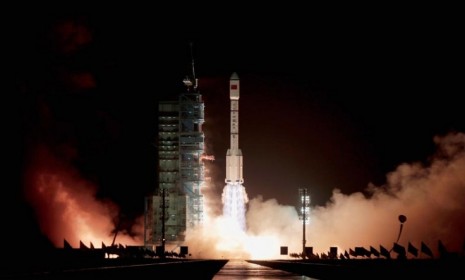China's first space station: What it means for America
Just two months after NASA ends its aging shuttle program, the emerging Asian superpower celebrates a historic space mission

A free daily email with the biggest news stories of the day – and the best features from TheWeek.com
You are now subscribed
Your newsletter sign-up was successful
China sent its first space laboratory module into space Wednesday — just in time for the country's People's Republic National Day on October 1. What does China's historic launch mean? Here's what you should know:
How important is this launch?
Very. The launch this week of the 8.5-ton Tiangong-1 module — "Tiangong" is Chinese for "heavenly palace" — marks the nation's first step toward assembling a manned space station orbiting Earth. China will use this experimental module to practice docking maneuvers when another unmanned craft is launched later this year. When the actual space station is finished, sometime around 2020, it's expected to weigh in at about 60 tons — "considerably smaller than the 16-nation International Space Station, which is expected to continue through to 2028," reports Britain's Telegraph.
The Week
Escape your echo chamber. Get the facts behind the news, plus analysis from multiple perspectives.

Sign up for The Week's Free Newsletters
From our morning news briefing to a weekly Good News Newsletter, get the best of The Week delivered directly to your inbox.
From our morning news briefing to a weekly Good News Newsletter, get the best of The Week delivered directly to your inbox.
Why does China want a space station?
"It's prestige," James Lewis, a senior fellow at the Center for International Studies, told Bloomberg Businessweek. The country sees space as an arena that not only puts it "on a par" with the West, but also gives China a commanding lead over South Korea and India. It's the country's way of saying "we've entered the club" — especially now that the United States has ended its own shuttle program.
What does it mean for the U.S.?
NASA's goal now that the shuttle program is over is to scale back on "routine manned missions" and instead plan for future deep-space exploration. America's step back gives China an opening — and confidence. It won't be good news, Joan Johnson-Freese, a professor at the U.S. Naval War College, tells Bloomberg Businessweek, if China eventually corners the market on "ferrying individuals" to and from the moon. "Ceding human spaceflight to the Chinese over the long term would have significant strategic leadership implications."
A free daily email with the biggest news stories of the day – and the best features from TheWeek.com
Sources: BBC, Bloomberg Businessweek,Telegraph, TIME
-
 How Democrats are turning DOJ lemons into partisan lemonade
How Democrats are turning DOJ lemons into partisan lemonadeTODAY’S BIG QUESTION As the Trump administration continues to try — and fail — at indicting its political enemies, Democratic lawmakers have begun seizing the moment for themselves
-
 ICE’s new targets post-Minnesota retreat
ICE’s new targets post-Minnesota retreatIn the Spotlight Several cities are reportedly on ICE’s list for immigration crackdowns
-
 ‘Those rights don’t exist to protect criminals’
‘Those rights don’t exist to protect criminals’Instant Opinion Opinion, comment and editorials of the day